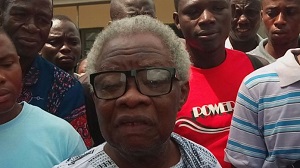
The Government will be under strong pressure to react with swift firmness against the Western Togoland sovereignty movement, following the movement’s audacious moves against the state of Ghana at the weekend of 24-25 September 2020.
The ability of the secessionists to close some roads in the Volta Region and attack police stations, was disconcerting. The Volta Region authorities were quick to point out that they had been able to prevent attacks on important installations. But they could not deny that they did not obtain adequate intelligence about all the group’s planned attacks.
The usual temptation, when such lapses in security occur, is to over-react and launch far-reaching reprisals. But if that happens, the secessionist would win a second victory: an increase in disaffection against the Government in the area. For widespread reprisal attacks on a civilian population, during an insurgency, wins sympathy for the insurgents, especially from innocent people caught up in the crossfire, who may have had nothing to do with the attacks.
But reprisals ARE necessary in such situations, both to demonstrate the power of the state and to teach those who sympathise with the insurgents that there is a heavy price to pay for supporting the rebellion. The problem is how to strike a balance between the two opposing demands – that of affirming the state’s determination to defend itself and its citizens, and yet
not overstepping the mark and acting as a recruiting agent for the insurgents.
If before the attacks, the Government had been trying to negotiate in good faith with some elements in the insurgent group (such groups always consist of both “hard-line” and “conciliatory” elements) efforts should be made to reinforce the approaches made earlier. At such crucial moments, the soft-liners would be under pressure not to “surrender” on “the eve of victory”, and may be even accused of being “traitors”.
In such an atmosphere, the Government needs to be very clever in the way it manages its relations its “contacts”, as the slightest slip-up could lead to agents being blown, with tragic consequences, such as possible liquidation.
Unfortunately, these tensions will last for some time, for even if negotiations are opened, they are likely to be intractable. We saw this happen in Sudan: the African Union, the United Nations and some religious groups were all involved. But when it seemed as if the main objective – South Sudan’s independence – was to be achieved, the independence movement itself was struck with internecine fratricide, and many blood-soaked months followed. Even today, many Southern Sudanese people live in daily fear of being attacked.
The other example of these tragic situations that come to mind, is, of course, the Biafran civil war of 1967-70. I’ve written about my personal experience of that tragedy, and I do feelthat what I wrote is so relevant to the Western Togoland situation today that I have to quote some of it to enable my readers to reabsorb the serious warnings I issued when the piece was originally published:
On January 5, 1967, I was at Accra airport on reporting duties for the London Observer newspaper and hoping to run into some of the delegates who were attending the “Aburi Conference” on Nigeria’s future, hosted by Lt-General Joseph Ankrah, Chairman of Ghana’s ruling “National Liberation Council.”
Luck was on my side, for who would be sitting in the VIP lounge of the airport but Col. Odumegwu Ojukwu, then Governor of the Eastern Region of Nigeria and leading actor in the Nigeria-Biafra tragedy.
With him was Mr E H Boohene, an old friend of Ojukuwu’s from Oxford University and then Managing Director of Ghana Airways Corporation.
It was through interventions by persons like Boohene that the Aburi Conference had been made possible.
Ghanaians in top positions who had an affinity with Nigerian soldiers and civilians of influence, had become fully aware that Nigeria was on the way to a blood-spilling, fratricidal, civil war. For between May and September 1966, killings of Nigerians by Nigerians, had led to reports that a “pogrom” of Igbos in the North (in particular) was taking place. The figure usually reported was 30,000 Igbos, massacred by “Northerners.”
General Ankrah, to his credit, wanted to do as much as possible to prevent further killings from taking place anywhere in Nigeria. Under Ankrah’s discreet chairmanship, an “Aburi Accord” was negotiated over a period of two days, and the Nigerians went back home. Col Ojukwu was waiting for a plane to take him back home when I ran into him at Accra airport.
His demeanour was not cheerful. In reply to my enquiries as to how the meeting at Aburi had gone, he said – ominously –”We have agreed to so many things before! But the trouble has always been with the implementation of what we’d agreed upon.”
True to form, when the Nigerian delegations went back home, their differing “interpretations” of the key decisions taken at Aburi, led to very serious disagreements between the Eastern Region and the Federal sides. They accused each other of “bad faith.” And, on May 30, 1967, Ojukwu declared the coming into existence of a “Republic of Biafra”, to be headed by himself.
A ferocious civil war immediately followed this declaration, and by the time Biafra surrendered on January 15, 1970, an estimated 2 million people or so had lost their lives. On both sides.
If you were to ask any Nigerian today, what was achieved by the civil war, and he were to answer you truthfully, he might say, “We experienced in full, the unexpected consequences of carrying out ethnically-based politics”
I recall these events in Nigeria because there are Ghanaians who, probably unaware of what the Nigerian civil war did to Nigeria, have begun to follow the same steps that brought the Igbos their greatest-ever ethnic tragedy. At Ho on 16 November 2019, a separatist group declared ‘independence’ for ‘Western Togoland’
It should be noted that in 1956, the United Nations Organisation (from which the “Western Togoland” politicians say they are seeking recognition) organized a plebiscite to find out whether the people of the area (who had hitherto lived under UN Trusteeship, administered by Britain) wanted to become part of the new state of Ghana on 6 March 1957.
The result of the UN plebiscite was that the people chose to form part of Ghana. The UN implemented the result of the plebiscite and “Western Togoland” thus became part and parcel of independent Ghana.
Of course, in the plebiscite, there were many people who voted against becoming part of Ghana. That the remnants of this minority have declared their “independence” now is no doubt a provocation.
But the NPP would be well-advised to handle the issue with tact and maturity.
I still maintain the stand that the NPP should be extremely wary in tackling this problem of Western Togoland’s “sovereignty”
By CAMERON DUODU




